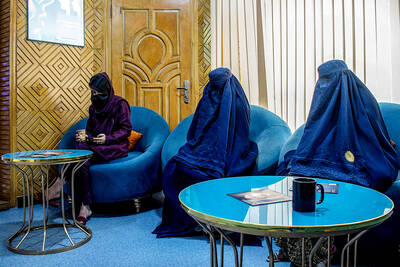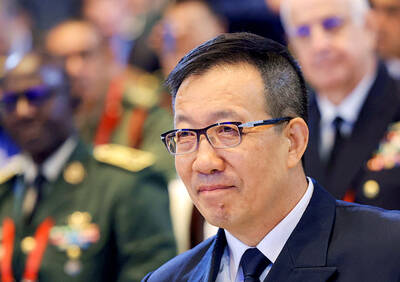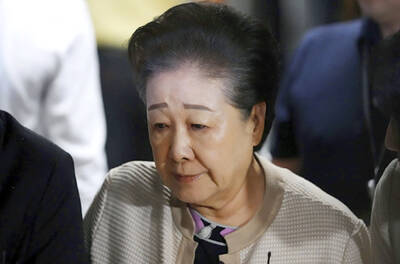When US President George W. Bush comes back from his Texas ranch at the end of the month, he'll need a vacation from his vacation.
True, he has spent time relaxing in the Sisyphean struggle of clearing cedar and brush. But events of the past week, from the blackout to Arnold Schwarzenegger's entry into the California governor's recall race, ruined the most meticulous of White House plans.
Bush loves order, but disorder was what he got. Perhaps he should have been expecting it. After all, strange things happen in August, like Iraq's invasion of Kuwait in 1990 or the coup that began against then president Mikhail Gorbachev of the Soviet Union in 1991. Last August, Bush fended off questions about whether he would authorize an attack on then Iraqi president Saddam Hussein after Brent Scowcroft, the president George Bush's national security adviser, warned of the consequences.
Last week, Schwarzenegger was the first to put a cloud over Bush's sunny Texas holiday. More than a month ago, the White House political operation and Bush's re-election campaign organized a quick two-day trip to California from Crawford with the usual efficiency, blending prodigious fund raising (US$2 million to be raised in two speeches of 20 minutes each) with a pep talk to US troops and a scenic promotion of Bush's environmental policies in the Santa Monica Mountains.
But the actor's announcement forced Bush into talking about the very thing he most wanted to avoid, which was Schwarzenegger. Although Bush is said to favor the actor in the recall, he is loathe to say so publicly for fear of being accused of manipulating the race.
He is also not accustomed to taking second billing, as was evident on Wednesday, when a reporter made the mistake of referring to the California race as "the biggest political story in the country" during an otherwise sleepy mini-news conference focused on the economy.
"It is the biggest political story in the country?" Bush retorted, irritated. "That's interesting. That says a lot. That speaks volumes."
"You don't agree?" the reporter said.
"I don't get to decide the biggest political story," Bush said, grumpily. "You decide the biggest political story. But I find it interesting that that is the biggest political story in the country, as you just said."
Another reporter jumped in: "You don't think it should be?"
"Oh, I think there's maybe other political stories," Bush replied. "Isn't there, like, a presidential race coming up?"
Schwarzenegger's entry also pushed Bush into saying for the first time that he is engaged in politicking for next year, a way-off message admission.
When asked if he was "going to do anything for Arnold," Bush replied, "I'm going to campaign for George W., as you know."
Two days later, Bush had zoomed back on track at a Bush-Cheney '04 lunch in Irvine, California, when he repeated the line from his fund-raising stump speech that "right now I'm focused on the people's business" and "the political season will come in its own time."
At that point, Bush was in any case wrestling with the blackout, which drowned out much of his California trip from the airwaves. On Thursday morning he managed a sequel to his Top Gun landing on the aircraft carrier Abraham Lincoln with a walk through a cordon of F-18 fighter jets at the Miramar Marine Corps Air Station, all the while dressed in a photogenic olive-colored military jacket despite the sweltering sun. But by the afternoon, Bush was sequestered with aides in his suite at the San Diego Hyatt trying to sort out the power failure, then he spoke briefly to the nation that evening.
On Friday, questions about the blackout dominated an event in the Santa Monica Mountains that was meant to show Bush as concerned about America's national parks.
Of course, the California trip was hardly a failure in that the Bush campaign collected another US$2 million to add to the US$40 million it already has. Gerald L. Parsky, Bush's top strategist in California, enthused that "the trip to California was a great success."
"It's an illustration of how much he cares about California," Parsky said.
Bush has no public plans until Thursday, when he is to leave for a two-day trip to Oregon and Washington state. But five days without sight of the president after the worst blackout in the nation's history, when Democrats are blaming the administration for the failure, seems unlikely.
Bush will be under pressure to visit one of the blackout states, or at least speak up, on another fun day of his summer vacation.

Decked out with fake crystal chandeliers and velvet sofas, cosmetic surgery clinics in Afghanistan’s capital are a world away from the austerity of Taliban rule, where Botox, lip filler and hair transplants reign. Despite the Taliban authorities’ strict theocratic rule, and prevailing conservatism and poverty in Afghanistan, the 20 or so clinics in Kabul have flourished since the end of decades of war in the country. Foreign doctors, especially from Turkey, travel to Kabul to train Afghans, who equally undertake internships in Istanbul, while equipment is imported from Asia or Europe. In the waiting rooms, the clientele is often well-off and includes men

BEIJING FORUM: ‘So-called freedom of navigation advocated by certain countries outside the region challenges the norms of international relations,’ the minister said Chinese Minister of National Defense Dong Jun (董軍) yesterday denounced “hegemonic logic and acts of bullying” during remarks at a Beijing forum that were full of thinly veiled references to the US. Organizers said that about 1,800 representatives from 100 countries, including political, military and academic leaders, were in Beijing for the Xiangshan Forum. The three-day event comes as China presents itself as a mediator of fraught global issues including the wars in Ukraine and Gaza. Addressing attendees at the opening ceremony, Dong warned of “new threats and challenges” now facing world peace. “While the themes of the times — peace and development —

COMFORT WOMEN CLASH: Japan has strongly rejected South Korean court rulings ordering the government to provide reparations to Korean victims of sexual slavery The Japanese government yesterday defended its stance on wartime sexual slavery and described South Korean court rulings ordering Japanese compensation as violations of international law, after UN investigators criticized Tokyo for failing to ensure truth-finding and reparations for the victims. In its own response to UN human rights rapporteurs, South Korea called on Japan to “squarely face up to our painful history” and cited how Tokyo’s refusal to comply with court orders have denied the victims payment. The statements underscored how the two Asian US allies still hold key differences on the issue, even as they pause their on-and-off disputes over historical

BRIBERY ALLEGATIONS: A prosecutor said they considered the risk of Hak-ja Han tampering with evidence to be very high, which led them to seek the warrant South Korean prosecutors yesterday requested an arrest warrant for the leader of the Unification Church, Hak-ja Han, on allegations of bribery linked to the country’s former first lady and incitement to destroy evidence. The move came a day after the 82-year-old was questioned over her alleged role in bribing former first lady Kim Keon-hee and a lawmaker. Founded in 1954 by her late husband, Sun Myung Moon, the Unification Church has long been the subject of controversy and criticism, with its teachings centered on Moon’s role as the “second coming” and its mass weddings. Followers are derisively referred to as “Moonies.” However, the church’s